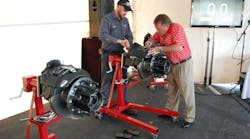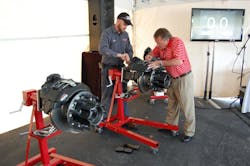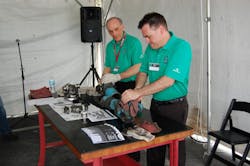Take the by now familiar comparison between air disc brakes (ADBs) and drum (also known as foundation) brakes. Both provide the required amount of stopping power to comply with newly enhanced federal regulations, yet ADBs get props for eliminating brake fade while drums are hailed as a lower-cost and lighter solution due to design and material revisions.
But here’s another question: if changing the pads on an ADB requires far less time than a comparable drum brake package, is that time savings of value to a fleet?
Meritor conducted just such a demonstration for 50 fleet representatives at the aforementioned Expo, which you can view below. Pitting a veteran truck technician from the nearby Peachtree Freightliner Truck dealership swapping shoes on a drum brake against fleet managers changing pads on a comparable ADB hub, the time savings were pretty stark: 11 to 12 minutes versus 3 minutes and 30 seconds.
Matt Creech with Meritor’s brake group said on average the time savings from an ADB pad change-out compared to a drum brake shoe swap in on the order of 75%.
But is that time savings worth enough to offset the still-higher premium for ADBs? Therein, then, lies part of the “relative value” question that needs answering.
Here’s another example, this time using Meritor’s RPL driveline; an acronym that stands for “Rockwell Permanently Lubricated” thus meaning no lubricants need be added on an ongoing basis.
Meritor’s Karl Mayer (in the foreground, with Tom Sanko to his right) argued that a typical driveline will need lubricant added roughly every 50,000 miles. So, by eliminating lube changes, not only does that save a fleet $3 worth of lubricant, it also saves the roughly 0.25 worth of man hours and shop time needed to complete this task – a savings Meritor estimates to be about $20, based on an $80 per hour labor rate.
Thus, over 600,000 miles of operation, a permanently lubricated driveline gets to skip 12 driveline maintenance intervals at $23 a pop (that $3 worth of lube added to $320 worth of shop time) saving a fleet some $276 per unit.
Again, though, is such a savings worth the extra up-front investment in a permanently-lubricated driveline? Maybe … but maybe not. Thus it’s up to the fleets to figure out when and where such “small savings” can add up over time to a bigger benefit.





